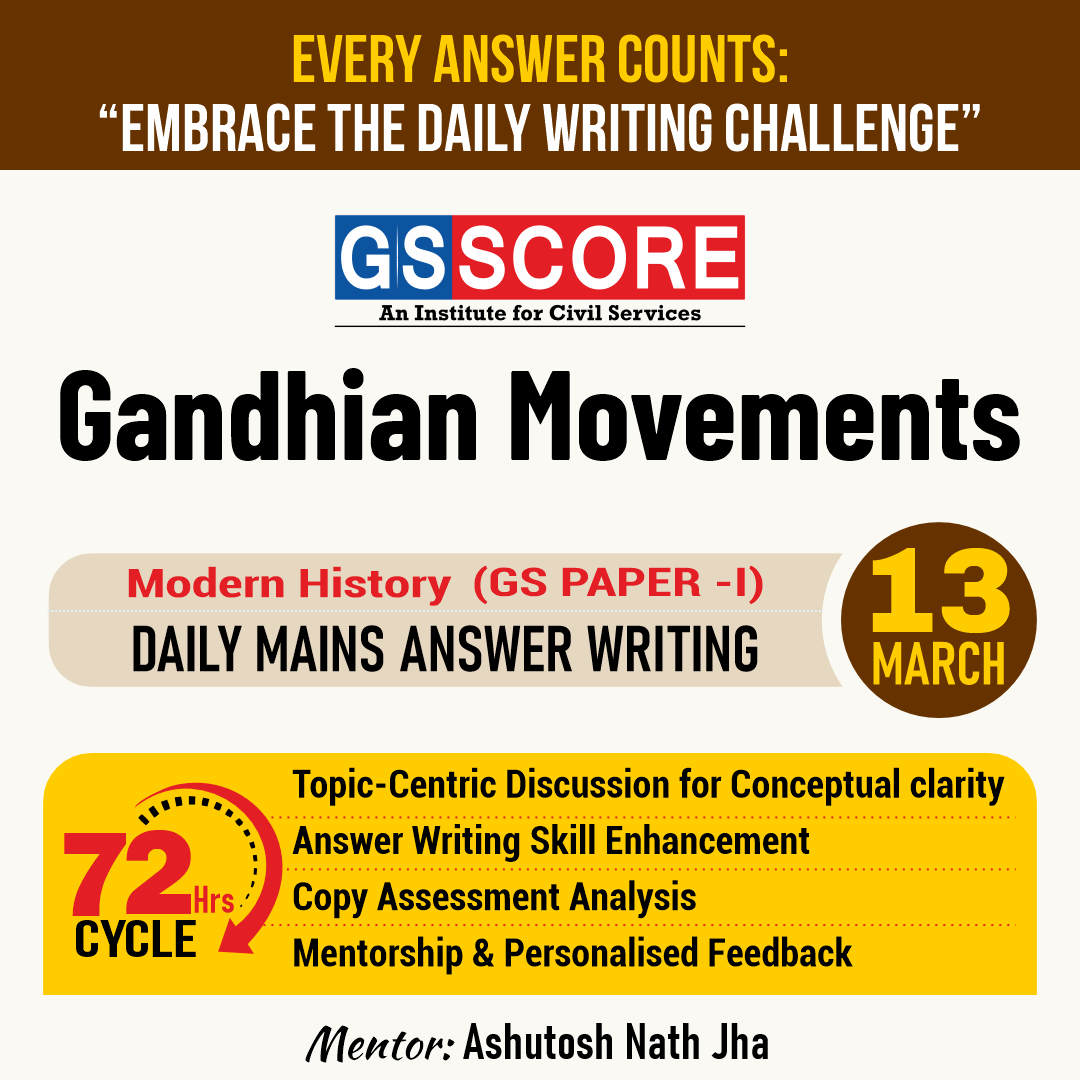


Instruction:
- There will be 2 questions carrying the First Question is-10 marks Write your answers in 150 words and the Second Question is-15 marks Write your answers in 250 words.
- Any page left blank in the answer-book must be crossed out clearly.
- Evaluated Copy will be re-uploaded on the same thread after 2 days of uploading the copy.
- Discussion of the question and one to one answer improvement session of evaluated copies will be conducted through Google Meet with concerned faculty. You will be informed via mail or SMS for the discussion.
Question #1. The kind of politics Mahatma Gandhi introduced Indians to, during Indian freedom struggle were not entirely new. Comment. 10 marks (150 words)
Question #2. Examine the significance and repercussions of the Civil Disobedience Movement in India's fight for independence. Assess Gandhiji's role in shaping the narrative and strategies of the freedom struggle. 15 marks (250 words)
(Examiner will pay special attention to the candidate's grasp of his/her material, its relevance to the subject chosen, and to his/ her ability to think constructively and to present his/her ideas concisely, logically and effectively).
STEPS & INSTRUCTIONS for uploading the answers
Step 1 - The Question for the day is provided below these instructions. It will be available at 7:00 AM.
Step 2 - Uploading of Answers : Write the answer in A4 Sheet leaving proper margins for comments and feedback and upload the PDF in MY ACCOUNT section. Click on the option of SUBMIT COPY to upload the PDF.
Step 3 - Deadline for Uploading Answers: The students shall upload their answers by 7:00 PM in the evening same day. The first 50 copies will be evaluated.
Step 4 - Feedback : Mentors will give their feedback for the answers uploaded. For more personalised feedback, join our telegram channel by clicking on the link https://t.me/mains_answer_writing_cse . A one-to-one session will be conducted with the faculty after copy evaluation in 72 Hrs.
Model Answer
Question #1. The kind of politics Mahatma Gandhi introduced Indians to, during Indian freedom struggle were not entirely new. Comment. 10 marks (150 words)
The political strategies introduced by Mahatma Gandhi during the Indian freedom struggle, although groundbreaking in their scale and impact, were not entirely novel. Gandhi's approach, centered around passive resistance, non-violence, and non-cooperation, indeed drew inspiration from pre-existing political ideologies and movements in India.
Gandhi's emphasis on passive resistance and non-violence echoed the ethos of earlier movements such as the Swadeshi movement, where Indians boycotted British goods as a form of protest against colonial rule. Similarly, during the moderates' era in the Indian National Congress, leaders like Dadabhai Naoroji and Gopal Krishna Gokhale advocated for constitutional methods and non-violent protests to achieve political reforms.
Gandhi's political philosophy was deeply influenced by his mentor, Gopal Krishna Gokhale, who emphasized the significance of self-discipline, non-violence, and constructive work as means of achieving political goals. Gandhi expanded upon these ideas and transformed them into a mass movement, mobilizing millions of Indians across class, caste, and religious lines.
Furthermore, Gandhi's strategy of Satyagraha, or truth force, was rooted in ancient Indian concepts of dharma and ahimsa (non-violence). He revived and popularized these age-old principles, infusing them with modern political significance.
While Gandhi's political tactics were not entirely new, their widespread adoption and successful application on a mass scale during the freedom struggle marked a significant departure from previous approaches. His ability to mobilize the masses, galvanize public opinion, and challenge the might of the British Empire through non-violent means remains unparalleled in history.
while Gandhi's political strategies were informed by earlier movements and ideologies in India, his innovative application of these principles, along with his charismatic leadership, transformed the freedom struggle into a mass movement of unprecedented scale and significance.
Question #2. Examine the significance and repercussions of the Civil Disobedience Movement in India's fight for independence. Assess Gandhiji's role in shaping the narrative and strategies of the freedom struggle. 15 marks (250 words)
The Civil Disobedience Movement holds immense significance in India's quest for independence, marking a pivotal chapter in the nation's history. By advocating nonviolent resistance against British rule, Gandhiji introduced a powerful tool that mobilized masses and challenged colonial authority. The movement aimed to peacefully protest unjust laws and policies, fostering national unity and raising awareness about Indian rights and aspirations.
One of the key repercussions of the Civil Disobedience Movement was its ability to galvanize widespread participation across different sections of society, including peasants, workers, women, and students. Through acts of civil disobedience, such as boycotting British goods, organizing salt marches, and promoting indigenous handicrafts, the movement undermined British economic interests and demonstrated Indian self-reliance.
Gandhiji's role in shaping the narrative and strategies of the freedom struggle was instrumental. His philosophy of Satyagraha, or nonviolent resistance, became the guiding principle of the movement, inspiring countless individuals to peacefully resist British oppression. Gandhiji's emphasis on moral courage, truth, and compassion resonated deeply with the Indian populace, fostering a sense of collective empowerment and dignity.
Furthermore, Gandhiji's leadership style, characterized by humility, inclusivity, and empathy, helped bridge diverse perspectives within the freedom movement. He emphasized the importance of constructive work, community service, and self-discipline, cultivating a culture of self-sacrifice and national pride.
Overall, the Civil Disobedience Movement not only challenged British authority but also laid the groundwork for India's eventual independence. Gandhiji's visionary leadership and unwavering commitment to nonviolence continue to inspire movements for justice and equality worldwide.


